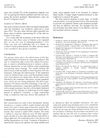 October 1997 in “Dermatologic Surgery”
October 1997 in “Dermatologic Surgery” The Epilight Hair Removal System is effective for temporary hair removal with few side effects, but more research is needed to confirm its safety and long-term results.
20 citations,
June 2014 in “Pharmaceutical research” Using both hyaluronic acid compounds together improves skin hydration and reduces wrinkles better than using one alone.
5 citations,
January 1997 in “PubMed”  41 citations,
November 1987 in “British Journal of Dermatology”
41 citations,
November 1987 in “British Journal of Dermatology” Ketoconazole cured about 70% of cutaneous leishmaniasis cases caused by Leishmania major.
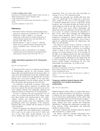 9 citations,
October 2014 in “Clinical and Experimental Dermatology”
9 citations,
October 2014 in “Clinical and Experimental Dermatology” Temporary hair loss can occur after brain AVM treatment but usually regrows in 8 weeks.
 30 citations,
November 1996 in “Archives of Dermatology”
30 citations,
November 1996 in “Archives of Dermatology” UV rays can cause a type of hair loss known as telogen alopecia.
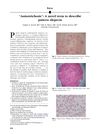 25 citations,
April 2007 in “Journal of The American Academy of Dermatology”
25 citations,
April 2007 in “Journal of The American Academy of Dermatology” The document suggests "anisotrichosis" as a new term for hair thickness variation in common baldness.
 January 2022 in “Clinical Cases in Dermatology”
January 2022 in “Clinical Cases in Dermatology” Stress can cause temporary hair loss, which usually gets better after the stress is gone.
 November 2009 in “Actas dermo-sifiliográficas/Actas dermo-sifiliográficas”
November 2009 in “Actas dermo-sifiliográficas/Actas dermo-sifiliográficas” Hair transplantation effectively treated a bald patch in an 18-year-old woman with Temporal Triangular Alopecia.
 September 2024 in “Journal of Clinical and Nursing Research”
September 2024 in “Journal of Clinical and Nursing Research” Combining Chuzhi Shengfa Tablets with ketoconazole shampoo or 5% minoxidil foam effectively promotes hair growth in men.
 May 2009 in “South African Family Practice”
May 2009 in “South African Family Practice” The author believes that giving medical conditions official names can sometimes overwhelm or scare patients.
 June 2023 in “Asian Journal of Pharmaceutical Research”
June 2023 in “Asian Journal of Pharmaceutical Research” Different types of hair loss require specific treatments, and new treatments are being developed.
4 citations,
September 2012 in “Transplant international” Graft rejection in a hand transplant may trigger hair loss due to autoimmune responses.
 December 2024 in “http://isrctn.com/”
December 2024 in “http://isrctn.com/” MpowerTM may improve hair growth and satisfaction more than plain minoxidil, with mild side effects.
 9 citations,
December 2010 in “Journal of The European Academy of Dermatology and Venereology”
9 citations,
December 2010 in “Journal of The European Academy of Dermatology and Venereology” Latanoprost therapy potentially caused a woman's white hair to darken again.
 3 citations,
May 2011 in “Practice nursing”
3 citations,
May 2011 in “Practice nursing” As skin ages, it gets thinner, paler, and more wrinkled, and protection and care like sunblock and moisturizers are important.
September 2022 in “International Journal of Trichology” Both microneedling and injections are equally effective for treating alopecia areata.
 5 citations,
April 2006 in “Skin Research and Technology”
5 citations,
April 2006 in “Skin Research and Technology” Scalp coverage scoring accurately measures hair loss and treatment effectiveness.
 7 citations,
February 2006 in “Clinical and Experimental Dermatology”
7 citations,
February 2006 in “Clinical and Experimental Dermatology” Using anabolic steroids 'Sus' and 'Deca' for bodybuilding caused severe acne in a man.
32 citations,
July 2001 in “Journal of the American Academy of Dermatology” SLHA can be hard to diagnose and needs teamwork between specialists.
 14 citations,
October 2020 in “Scientific reports”
14 citations,
October 2020 in “Scientific reports” Hair greying is linked to reduced ATM protein in hair cells, which protects against stress and damage.
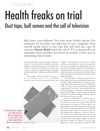 April 2014 in “Significance”
April 2014 in “Significance” Unconventional home remedies can sometimes show surprising results.
 27 citations,
July 1994 in “Human Pathology”
27 citations,
July 1994 in “Human Pathology” Understanding chaos and control mechanisms in disease can improve diagnosis and prediction in medicine.
 August 2008 in “Current Opinion in Internal Medicine”
August 2008 in “Current Opinion in Internal Medicine” In 2007, prostate cancer research improved understanding of risk, diagnosis, and treatment, but also showed heart risks with certain therapies and the need for personalized care.
 59 citations,
June 2008 in “Journal of The American Academy of Dermatology”
59 citations,
June 2008 in “Journal of The American Academy of Dermatology” The article explains the genetic causes and symptoms of various hair disorders and highlights the need for more research to find treatments.
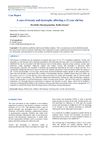 1 citations,
October 2019 in “International journal of contemporary pediatrics”
1 citations,
October 2019 in “International journal of contemporary pediatrics” A 12-year-old boy with twenty nail dystrophy, a condition affecting all nails, was treated conservatively due to its self-limiting nature and good prognosis.
 1 citations,
May 2016 in “Pharmaceutical Biology”
1 citations,
May 2016 in “Pharmaceutical Biology” Aspergillus niger culture creates two finasteride derivatives with enzyme-inhibiting effects.
12 citations,
January 2020 in “Indian Dermatology Online Journal” Female pattern hair loss has multiple causes and treatments, with new therapies showing promise.
 13 citations,
December 2017 in “BMC Complementary and Alternative Medicine”
13 citations,
December 2017 in “BMC Complementary and Alternative Medicine” The Asian herbal mix with Houttuynia cordata, Perilla frutescens, and green tea helped grow hair in mice.
 5 citations,
February 2017 in “Biomolecules & Therapeutics”
5 citations,
February 2017 in “Biomolecules & Therapeutics” 4-O-Methylhonokiol helps protect skin cells from growth-stopping effects of a protein by regulating growth-related pathways.
























